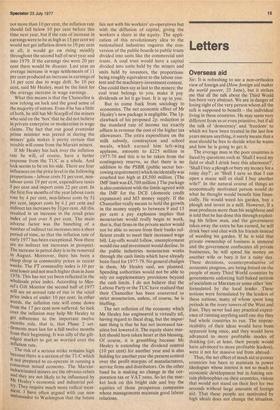Overseas aid
Sir: It is refreshing to see a non-orthodox view of foreign aid (How foreign aid makes the world poorer, 25 June), but it strikes lme that all the talk about the Third World has been very abstract. We are in danger of losing sight of the very person whom all the talk is supposed to benefit — the individual living in these countries. He may seem very different from us or even primitive, but if all the talk of 'democracy' and 'freedom' to which we have been treated in the last few years means anything, it surely means that a man should be free to decide what he wants and how he is going to get it.
The average man in the poor countries is faced by questions such as 'Shall I weed my field or shall I drink beer this afternoon?', 'Shall I buy a plough or bury my money for a rainy day?', or 'Shall I save so that I can open a maize mill or shall I buy another wife?' In the natural course of things an economically motivated person would do what he thought would benefit him financially. He would weed his garden, buy a plough and invest in a mill. However, if a man produces more than his neighbour and is told that he has done this through exploiting his fellow man, and the government takes away the extra he has earned, he will drink beer and chat with his friends instead of weeding his garden. If he is told that private ownership of business is immoral and the government confiscates all private businesses, he will spend his money on another wife or bury it for a rainy day. These decisions, counterproductive of economic progress, are being forced on the people of many Third World countries by governments enforcing half-baked notions of socialism or Marxism or some other 'ism' formulated by the local leader. These notions were formulated by the leaders of these nations, many of whom spent long periods in the ivory towers of the West and East. They never had any practical experience of running anything until one day they had whole countries to run. The impracticability of their ideas would have been apparent long since, and they would have advanced to more profitable modes of thinking (or, at least, their people would have advanced to more profitable leaders), were it not for massive aid from abroad.
Thus, the net effect of much aid to poorer countries has been to maintain in power ideologues whose interest is not so much in economic development but in forcing certain philosophies on their countries, visions that would not stand on their feet for two seconds without large amounts of foreign aid. That these people are motivated by high ideals does not change the situation. The effect of aid has also been, as noted in the article, to keep less high-minded despots in power. I feel that governments giving foreign aid should devise policies which encourage freedom and behaviour that leads to a better standard of life in the poorer countries. Some of the most effective foreign aid provides money to small groups of people who have freely banded together to build something they think will benefit them (a road or clinic, for example). The people donate what money they can and do the building, and the aid money is used to buy the materials they cannot afford.
J. Robbins clo 14 Millway Grove, Old Hartley, Tyne and Wear







































 Previous page
Previous page